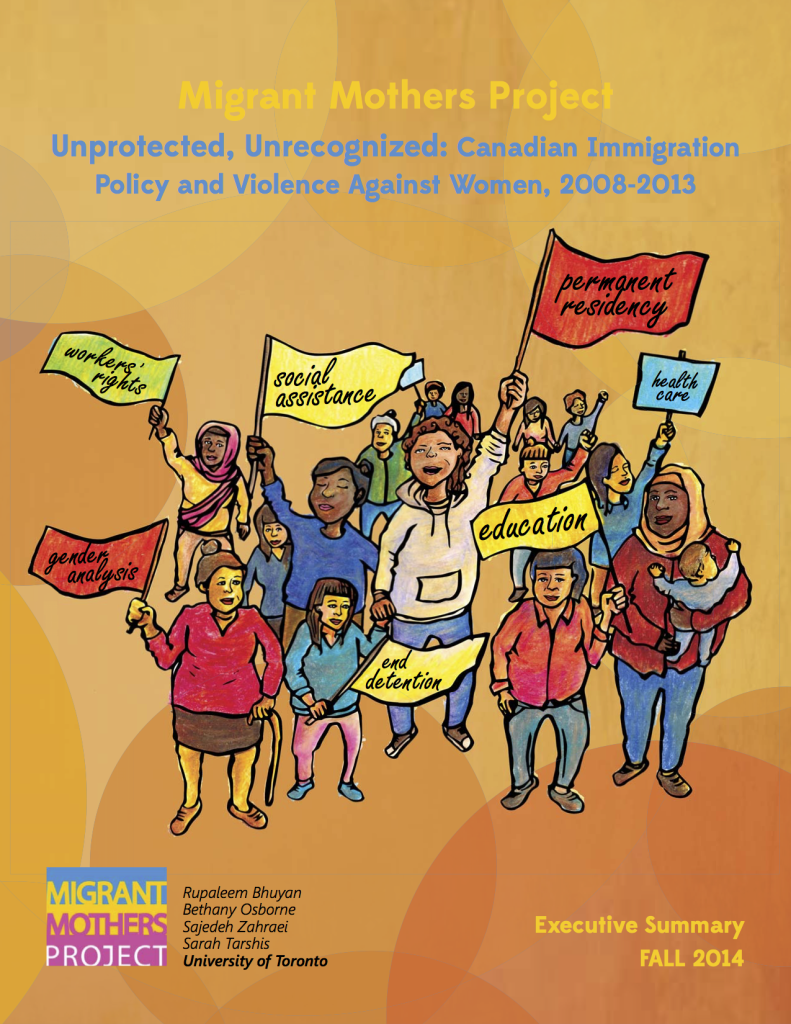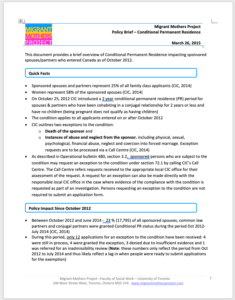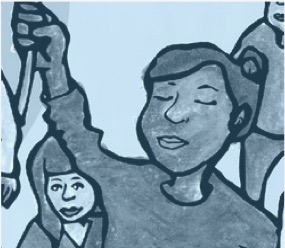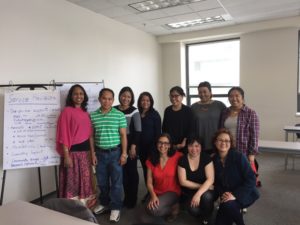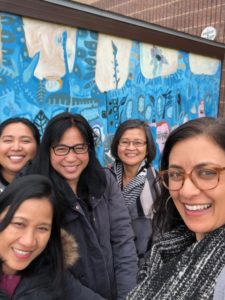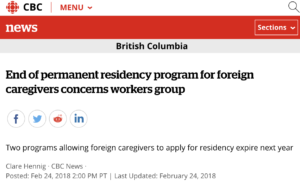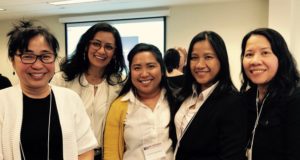A BRIEF HISTORY OF THE MIGRANT MOTHERS PROJECT
The Migrant Mothers Project (MMP) is a collaborative research project led by Rupaleem Bhuyan at the University of Toronto
in partnership with a network of service providers, legal advocates, community health workers, and grassroots women.
MMP uses participatory research methods to examine how immigration policies contribute to different forms of gender-based violence.
We also explore how immigrants and service providers advocate for immigrants’ rights to access social, legal, and health services.
RESEARCH
AND
DISSEMINATION
This includes data collection activities,
community forums, and publications.
COMMUNITY
ENGAGEMENT
AND ADVOCACY
This includes community forums,
solidarity group, and advocacy.
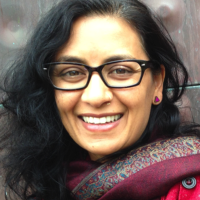 The Migrant Mothers Project (MMP) was originally launched in 2011 as a participatory action research project led by Dr. Rupaleem Bhuyan as principal investigator at the Factor-Inwentash Faculty of Social Work and Mercedes Umaña as the community collaborator from Women’s Health in Women’s Hands Community Health Centre.
The Migrant Mothers Project (MMP) was originally launched in 2011 as a participatory action research project led by Dr. Rupaleem Bhuyan as principal investigator at the Factor-Inwentash Faculty of Social Work and Mercedes Umaña as the community collaborator from Women’s Health in Women’s Hands Community Health Centre.
Between 2011-2014, the MMP’s research and dissemination work received funding support from the Social Sciences and Humanities Research Council’s Standard Research Grant, an award from CERIS-The Ontario Metropolis Centre, and the Connaught New Researcher Award from the University of Toronto.
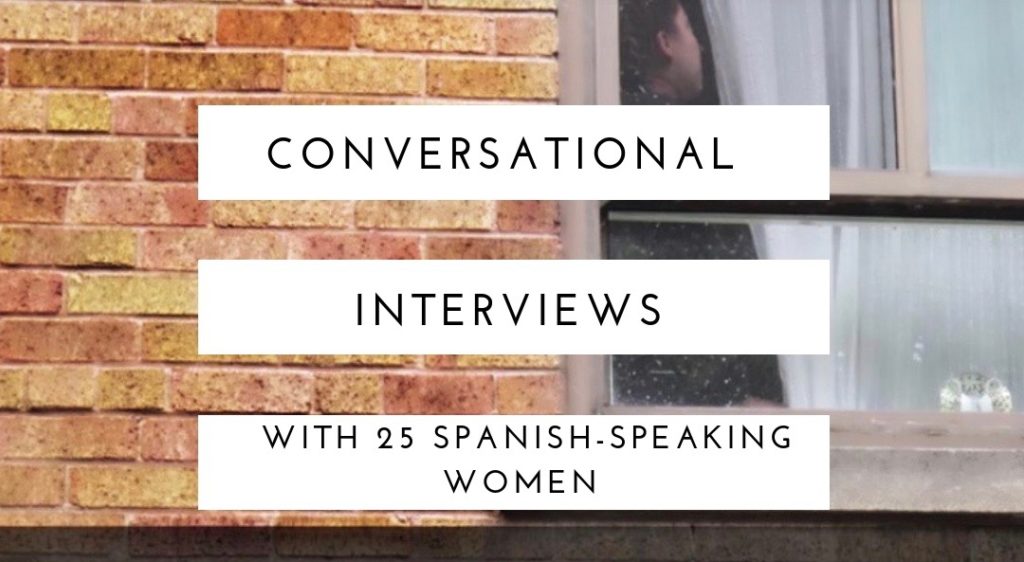
The MMP conducted conversational interviews with 25 Spanish-speaking women from Mexico, Colombia, and Central America. The interviews explored 1) how migrant women negotiate rights for themselves and their children and 2) how their immigration status shapes their response to gender-based violence and their ability to find safety and security.
 The MMP partnered with Toronto Rape Crisis Centre/Multicultural Women Against Rape to co-host Nuestra Fortaleza (Our Strength) a 12-week peer-led solidarity group for Spanish speaking women who have precarious immigration status a space to gather for cultural and recreational activities, and to share concerns and strategies in addressing their immigration concerns.
The MMP partnered with Toronto Rape Crisis Centre/Multicultural Women Against Rape to co-host Nuestra Fortaleza (Our Strength) a 12-week peer-led solidarity group for Spanish speaking women who have precarious immigration status a space to gather for cultural and recreational activities, and to share concerns and strategies in addressing their immigration concerns.
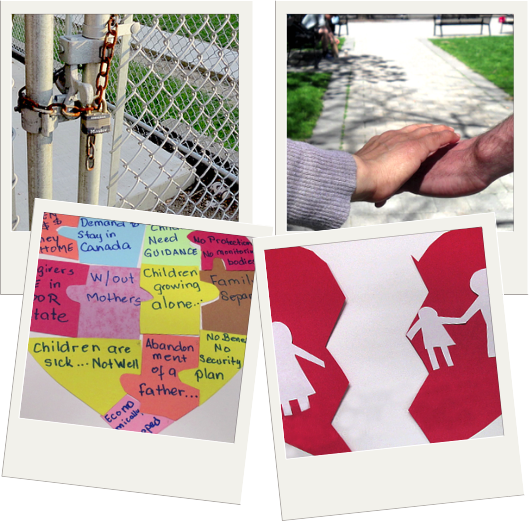 The MMP received an award of $2,196.80 from Becoming Neighbors to produce the “Till Immigration Tears Us Apart: Stories of Strength through Struggle” digital storytelling project.
The MMP received an award of $2,196.80 from Becoming Neighbors to produce the “Till Immigration Tears Us Apart: Stories of Strength through Struggle” digital storytelling project.
Publication: Bhuyan, R. and Smith-Carrier, T. (2012). Constructions of migrants’ rights in Canada: Is subnational citizenship possible? Citizenship Studies, 16(2), 203-221.
Read pre-pressed version here.
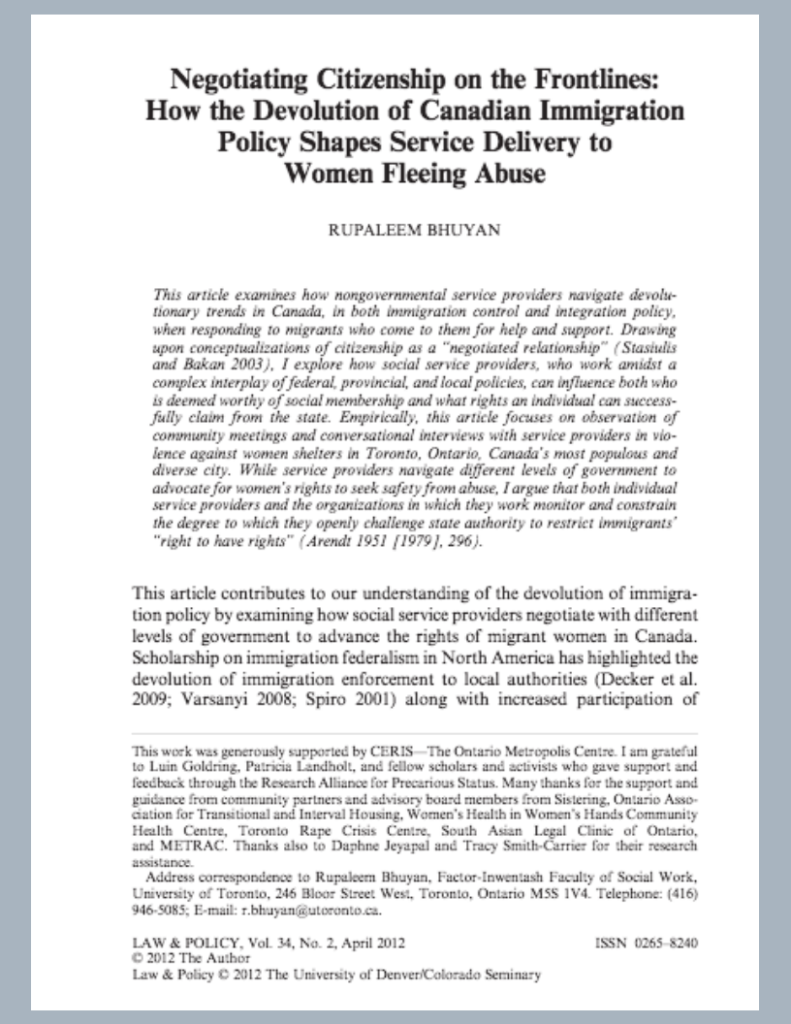
Publication: Bhuyan, R. (2012). Negotiating citizenship on the frontlines: How the devolution of Canadian immigration policy shapes service delivery to women fleeing abuse. Law & Policy, 3(2), 211-236.
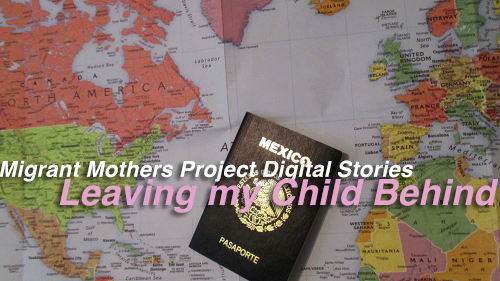 With generous support from Becoming Neighbours, participants of the solidarity group, Nuestra Forteleza, produced three Digital Stories by women who have precarious status. These stories featured women’s narratives of their challenges due to immigration policies and how they support themselves and their families.
With generous support from Becoming Neighbours, participants of the solidarity group, Nuestra Forteleza, produced three Digital Stories by women who have precarious status. These stories featured women’s narratives of their challenges due to immigration policies and how they support themselves and their families.
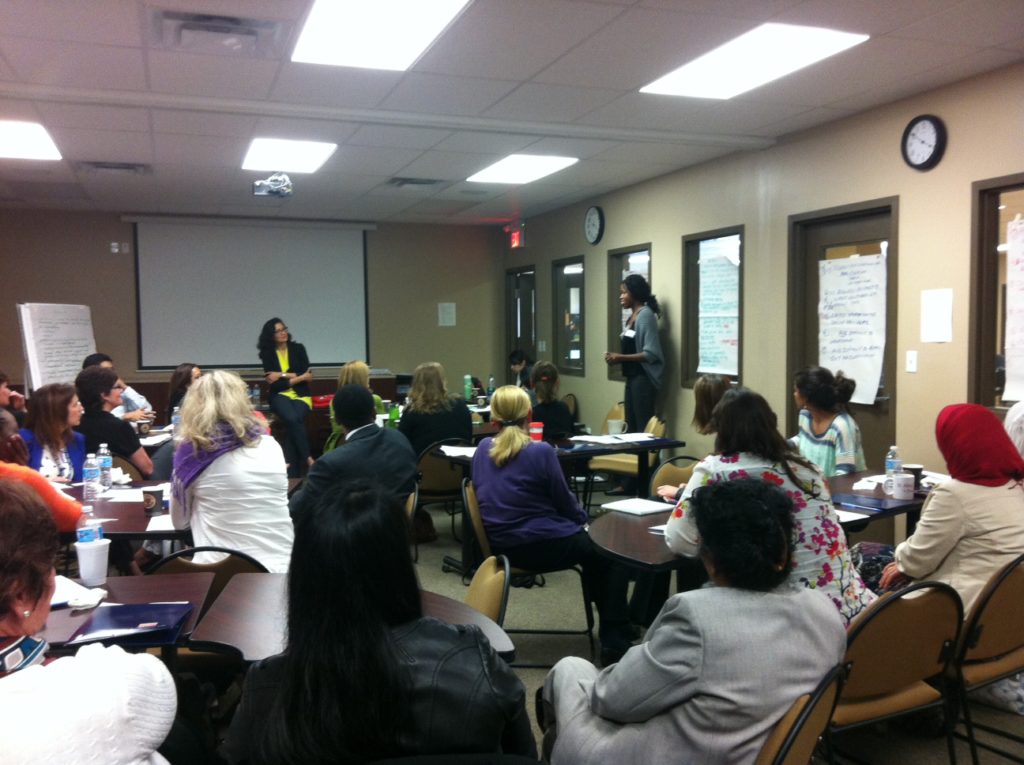 From 2012 to 2014, the MMP hosted a series of community forums and interviews with service providers across Canada to share preliminary findings and to gather insight from service providers who work with immigrants.
From 2012 to 2014, the MMP hosted a series of community forums and interviews with service providers across Canada to share preliminary findings and to gather insight from service providers who work with immigrants.
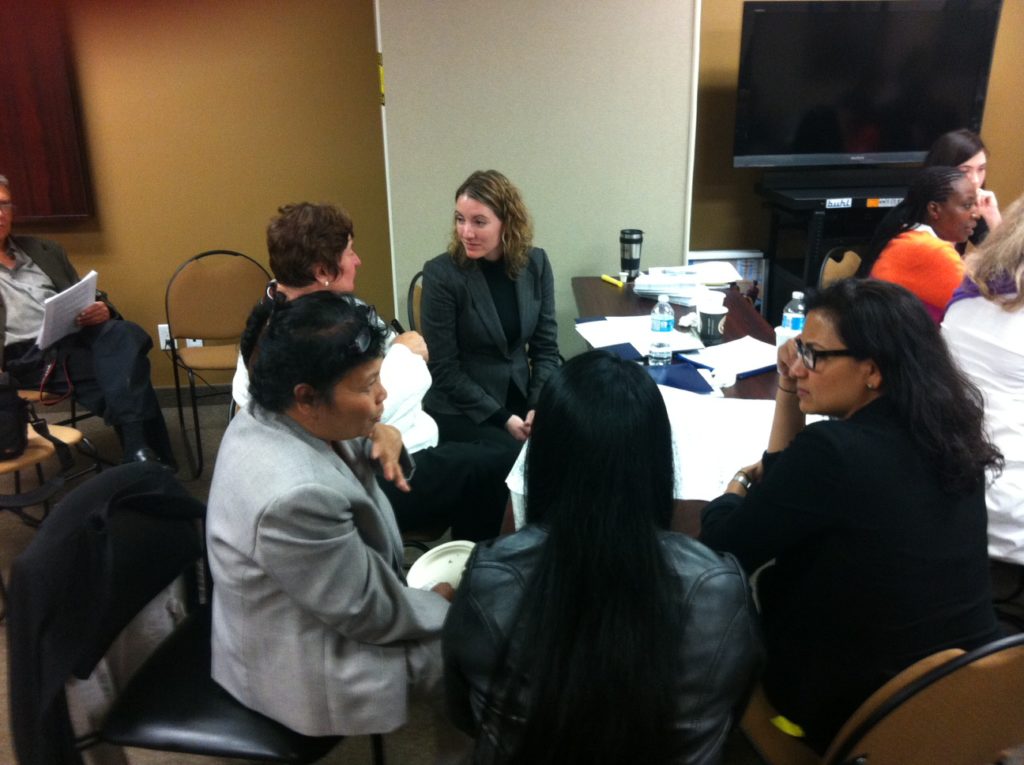
The forums were co-hosted by community partners in Kitchener/Waterloo, Niagara, Toronto, Ottawa, Windsor, Montreal and Vancouver. Through these forums, the MMP documented regional dynamics on how service providers navigate the federaland provincial policies in order provide services for women and their children. The MMP identified gaps in services and the negative impact that immigration enforcement activities (i.e. detention, deportations, and workplace raids) are having on access to services.
 On November 7th, 2013, the Migrant Mothers Project hosted, “Our Collective Strength,” a community event featuring poetry, spoken word, and expressive dance of immigrants with precarious statuses and their allies. This event was supported by the Women & Gender Studies Institute Community Knowledge Alliance initiative at the University of Toronto.
On November 7th, 2013, the Migrant Mothers Project hosted, “Our Collective Strength,” a community event featuring poetry, spoken word, and expressive dance of immigrants with precarious statuses and their allies. This event was supported by the Women & Gender Studies Institute Community Knowledge Alliance initiative at the University of Toronto.
 Over 70 people attended to network with student and community groups during the community fair, to raise consciousness on the intersections of violence against women, precarious immigration status, and human rights, as well as enjoy food prepared by Conscious Kosher Catering.
Over 70 people attended to network with student and community groups during the community fair, to raise consciousness on the intersections of violence against women, precarious immigration status, and human rights, as well as enjoy food prepared by Conscious Kosher Catering.
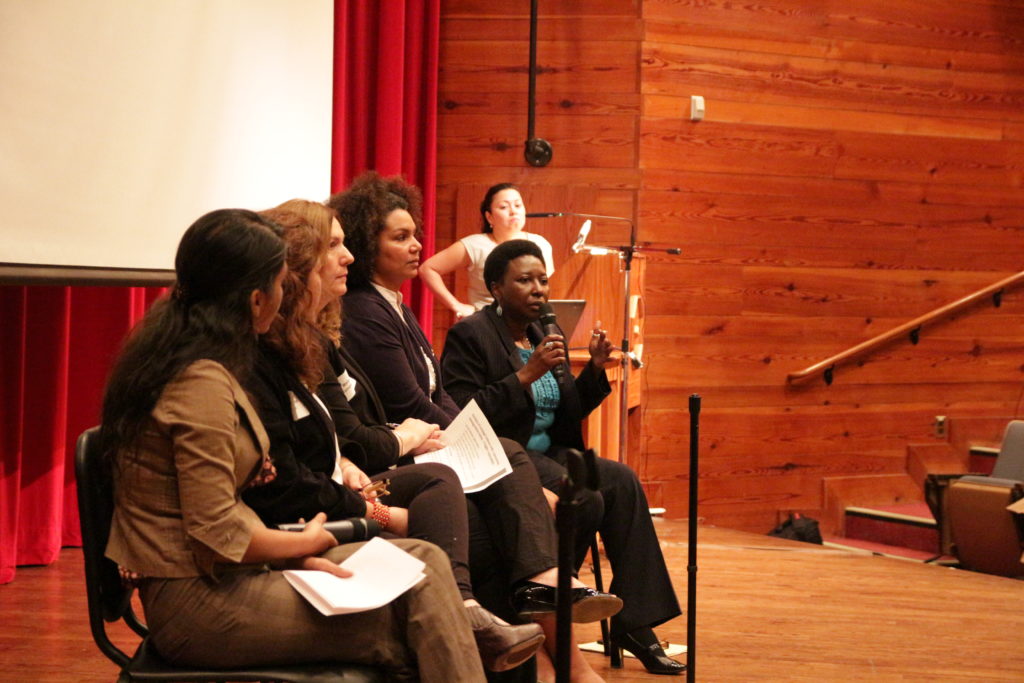 On June 5th, the MMP hosted over 120 people to take part in “Intersections of Violence Against Women and Precarious Immigration Status—A National Symposium for Advocacy and Community Mobilization”, in partnership with the Woman Abuse Council of Toronto.
On June 5th, the MMP hosted over 120 people to take part in “Intersections of Violence Against Women and Precarious Immigration Status—A National Symposium for Advocacy and Community Mobilization”, in partnership with the Woman Abuse Council of Toronto.
This full-day event held at the University of Toronto engaged service providers, activists, policy analysts, researchers and immigrant women in Canada to discuss advocacy strategies for/with immigrant women with precarious status on a range of cross-cutting issues.
Further resources are available on the symposium website.
By Rupaleem Bhuyan (Principal Investigator) and Anna Korteweg (Co-Investigator), the MMP received second major funding from Social Sciences and Humanities Research Council of Canada for an Insight Grant of $205,362 for four years, 2014 to 2018, on Substantive Rights in an Era of Crimmigration: Constructing the Deportable Subject in the Shadow of the State.
The first research report was published, “Unprotected, Unrecognized: Canadian Immigration Policy and Violence Against Women,” in November.
Publication: Bhuyan, R., Osborne, B., Zaraei, S. and Tarshis, S. (2014). Unprotected, Unrecognized: Canadian Immigration Policy and Violence against Women, 2008-2013. Toronto, Ontario: Migrant Mothers Project Report, University of Toronto. November.
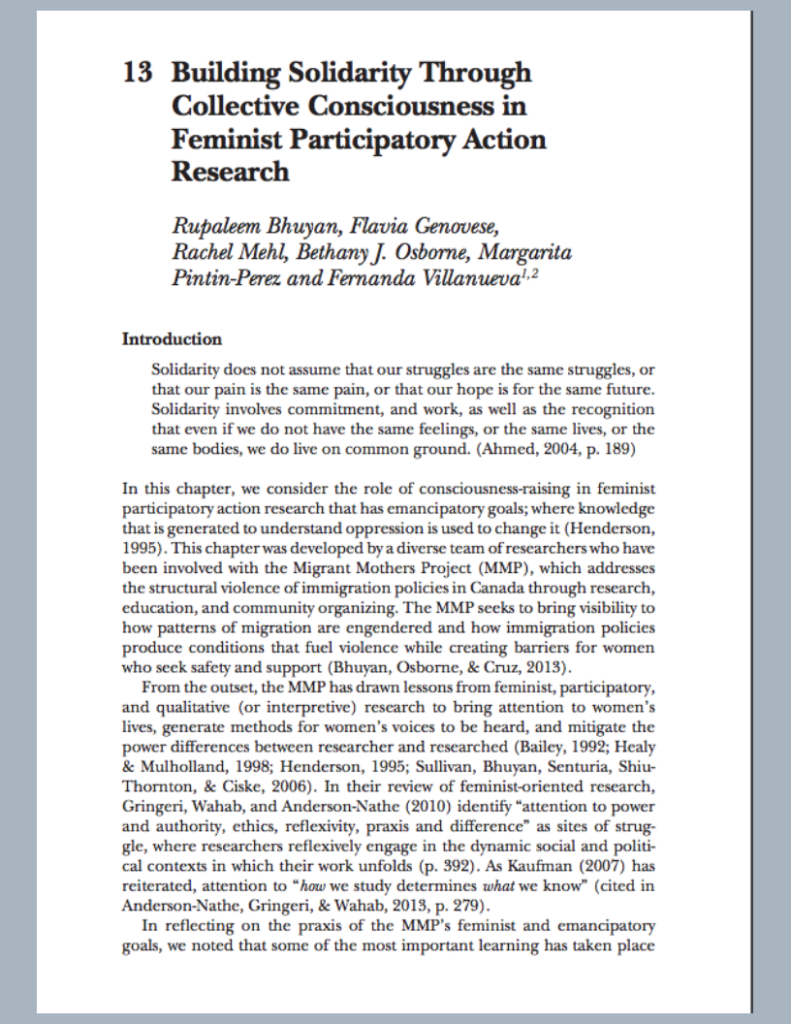 Publication: Bhuyan, R., Genovese, F., Mehl, R., Osborne, B.J., Pinton-Perez, M., and Villanueva, F. (2014). “Building solidarity through consciousness raising in feminist, participatory action research”. In Wahab, S. Gringeri, C. and Anderson-Nathe, B. (Eds). Feminisms in social work research: The promise and possibilities for justice-based knowledge. Routledge.
Publication: Bhuyan, R., Genovese, F., Mehl, R., Osborne, B.J., Pinton-Perez, M., and Villanueva, F. (2014). “Building solidarity through consciousness raising in feminist, participatory action research”. In Wahab, S. Gringeri, C. and Anderson-Nathe, B. (Eds). Feminisms in social work research: The promise and possibilities for justice-based knowledge. Routledge.
Read pre-pressed version here.
On March 26, the MMP released a policy brief on the Conditional Permanent Residence impacting sponsored spouses and partners who entered Canada as of October 2012.
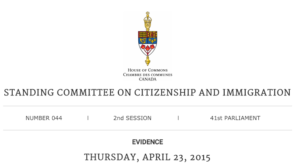 In April of 2015, Rupaleem Bhuyan spoke in the House of Commons Committees on Bill S-7, discussing the term barbaric and what constitutes as barbaric cultural practices. Since June 2015, Parliament passed Bill S-7 to amend the Immigration and Refugee Protection Act, the Civil Marriage Act and the Criminal Code.
In April of 2015, Rupaleem Bhuyan spoke in the House of Commons Committees on Bill S-7, discussing the term barbaric and what constitutes as barbaric cultural practices. Since June 2015, Parliament passed Bill S-7 to amend the Immigration and Refugee Protection Act, the Civil Marriage Act and the Criminal Code.
Available here in the House of Commons Committees page.

Rupaleem Bhuyan spoke on CBC Broadcast on the topic: “Family violence: What’s the role of the larger community” seen here.
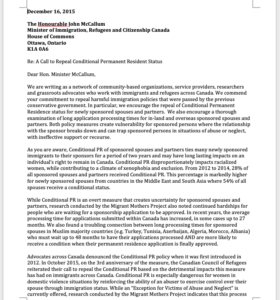 In January, the MMP Research Advisory Committee Co-Chairs, Harmy Mendoza and Marichu Antonio, emailed Minister John McCallum (Minister of Immigration, Refugees and Citizenship Canada), Arif Virani (Parliamentary Secretary, IRCC), and Minister Patty Hajdu (Minister of Status of Women) a policy brief and letter to express concerns regarding the consequences that the conditional aspect of the permanent residence policy has on women, especially those in abusive relationships.
In January, the MMP Research Advisory Committee Co-Chairs, Harmy Mendoza and Marichu Antonio, emailed Minister John McCallum (Minister of Immigration, Refugees and Citizenship Canada), Arif Virani (Parliamentary Secretary, IRCC), and Minister Patty Hajdu (Minister of Status of Women) a policy brief and letter to express concerns regarding the consequences that the conditional aspect of the permanent residence policy has on women, especially those in abusive relationships.
The policy brief highlights the disproportion among countries receiving the condition, the alarming processing times for sponsorship applications, and how disproportionately women are affected by this policy.
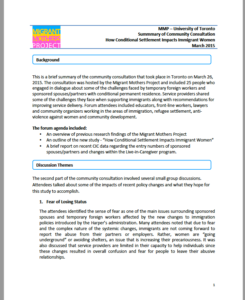 In March and April, the MMP hosted community forums in Edmonton, Calgary and Toronto for the Sponsored Spouses Study and Caregivers’ Journeys Study to engage and consult with educators, front-line workers, lawyers and community organizers on the challenges
In March and April, the MMP hosted community forums in Edmonton, Calgary and Toronto for the Sponsored Spouses Study and Caregivers’ Journeys Study to engage and consult with educators, front-line workers, lawyers and community organizers on the challenges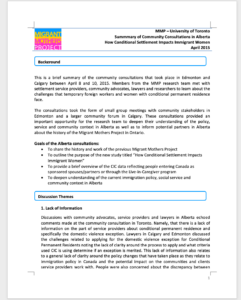
faced by temporary foreign workers and
sponsored spouses/partners with
conditional permanent residence.
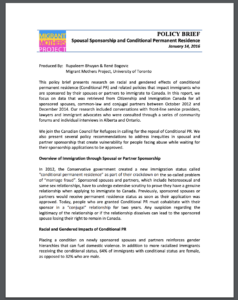 In January, a Policy Brief was submitted by Rupaleem Bhuyan and Rene Bogovic to the Minister of Immigration, Refugees and Citizenship Canada (IRCC) on Spousal sponsorship and conditional permanent residence. It presented research on racial and gendered effects of conditional permanent residence (Conditional PR) and related policies that impact immigrants who are sponsored by their spouses or partners to immigrate to Canada. See here for the full policy brief.
In January, a Policy Brief was submitted by Rupaleem Bhuyan and Rene Bogovic to the Minister of Immigration, Refugees and Citizenship Canada (IRCC) on Spousal sponsorship and conditional permanent residence. It presented research on racial and gendered effects of conditional permanent residence (Conditional PR) and related policies that impact immigrants who are sponsored by their spouses or partners to immigrate to Canada. See here for the full policy brief.
From August to December, the MMP’s Caregivers’ Journeys conducted 33 interviews.
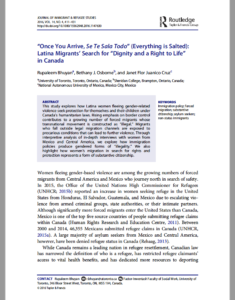 Publication: Bhuyan, R, Osborne, B. J., & Huanico Cruz, J. F. (2016). “Once You Arrive, Se Te Sala Todo” (Everything is Salted): Latina Migrants’ Search for “Dignity and a Right to Life” in Canada. Journal of Immigrant & Refugee Studies, 14(4), 411-431. See here.
Publication: Bhuyan, R, Osborne, B. J., & Huanico Cruz, J. F. (2016). “Once You Arrive, Se Te Sala Todo” (Everything is Salted): Latina Migrants’ Search for “Dignity and a Right to Life” in Canada. Journal of Immigrant & Refugee Studies, 14(4), 411-431. See here.
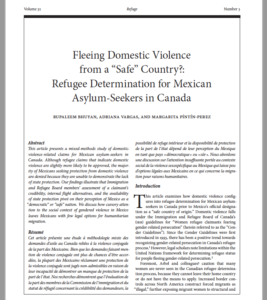 Publication: Bhuyan, R., Vargas, A., & Pintin-Perez, M.. (2016). Fleeing Domestic Violence from a “Safe” Country?: Refugee Determination for Mexican Asylum-Seekers in Canada. Refuge, 32(3), 95-107. See here.
Publication: Bhuyan, R., Vargas, A., & Pintin-Perez, M.. (2016). Fleeing Domestic Violence from a “Safe” Country?: Refugee Determination for Mexican Asylum-Seekers in Canada. Refuge, 32(3), 95-107. See here.
In February, the Research Advisory Committee consulted with David Cashaback (IRCC Director, Social Immigration Policy and Programs), Beverley McGee (Assistant Director, Social Policy, Immigration Branch) and Julie Schoenherr (Senior Policy Analyst) on IRCC’s immigration policy development. The MMP also shared research and policy recommendations.
The MMP’s Research Advisory Committee: Rupaleem Bhuyan, Harmy Mendoza, Maya Roy, Flor Dandal, Nicole Guthrie, Geri Sadoway.
In June, a Keynote Address was made to IRCC Staff during Gender-Based Analysis Awareness Week on “Migrant Women and Potential Vulnerabilities.”
In January, Rupaleem and Lorraine presented on the Caregivers’ program at the Society for Social Work and Research in Washington, D.C..
From the summer to fall, the MMP conducted 15 interviews with the Sponsored Spouses Study in Calgary and Toronto.
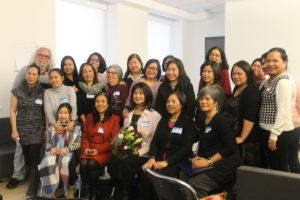
In February, the MMP hosted a community event in collaboration with a network of community groups and caregivers to share findings from the Caregivers’ Journeys Study and discuss ongoing issues with the “old” and “new” pathways. For 66 participants, the MMP hosted workshops on Signs of Abuse and Safety Planning for Caregivers, Family Reunification and Mental Health, and an Advocacy Strategy Session.
A tribute to Columbia “Coco” Tarape Diaz, who passed away in March 23, 2018, was made to applaud the significant advocacy work she contributed to the caregiver community.
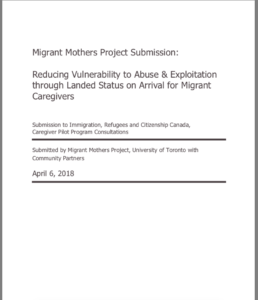 In March, recommendations to the IRCC were submitted on behalf of consultations with:
In March, recommendations to the IRCC were submitted on behalf of consultations with:
- Action Dignity;
- Assaulted Women’s and Children’s Counselor/Advocate Program (AWCCA) at George Brown College;
- Calgary Immigrant Women’s Association;
- Caregiver Connections Education and Support Organization;
- David Este, Pallavi Bannerjee, University of Calgary;
- Immigration Attorney;
- Kababayan Multicultural Centre;
- Long Mangalji LLP;
- Ontario Council of Agencies Servicing Immigrants;
- Pearlita Juan, Novabella Pendon, Former Live-In Caregivers;
- Sedef Arat-Koc, Ryerson University;
- South Asian Legal Clinic of Ontario;
- The Neighbourhood Organization (TNO);
- Wendy Aujla, University of Alberta;
- WomanACT.
See here for recommendations.
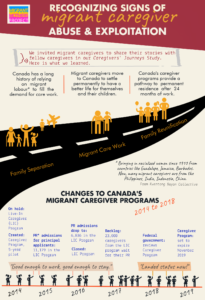 For knowledge translation, the MMP launched an infographic in October on Facebook, Twitter, and MMP website, named “Recognizing Signs of Migrant Caregiver Abuse & Exploitation.”
For knowledge translation, the MMP launched an infographic in October on Facebook, Twitter, and MMP website, named “Recognizing Signs of Migrant Caregiver Abuse & Exploitation.”
See here for the infographic.
Last updated February 2019
